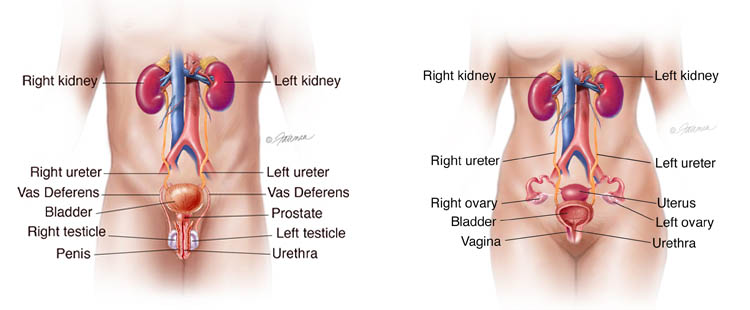Urinary Tract Infection (UTI) occurs when bacteria enter the urinary tract through the urethra and travel into the bladder.
The urinary tract, which starts with the kidneys and finishes with the urethra is normally a sterile area, meaning there are no microorganisms or bacteria present in it. However, the skin around the opening of the urethra (in men, the penis and in women, just in front of the vagina) is covered in millions and millions of microscopic bacteria. While these bacteria generally don’t cause any problems when they are on the outside of the body, they can often make their way into the urethra and then into the bladder, causing a UTI.
 The most common form of UTI is called cystitis, or bacterial infection of the bladder. Cystitis most frequently occurs in women, because the female urethra is much shorter than the male urethra, and this makes it easier for bacteria to get into a woman’s bladder. Up to 50 percent of women will experience an episode of cystitis during their lifetime, and these infections are usually easily diagnosed and treated. Symptoms of cystitis include:
The most common form of UTI is called cystitis, or bacterial infection of the bladder. Cystitis most frequently occurs in women, because the female urethra is much shorter than the male urethra, and this makes it easier for bacteria to get into a woman’s bladder. Up to 50 percent of women will experience an episode of cystitis during their lifetime, and these infections are usually easily diagnosed and treated. Symptoms of cystitis include:
- a burning sensation in the urethra when passing urine
- pain in the lower part of the abdomen
- needing to pass urine more frequently or urgently, or leaking urine
- blood in the urine
- cloudy or stronger smelling urine
If cystitis is diagnosed early, it can usually be treated with a short course of oral antibiotics, but in some cases, where the infection spreads more rapidly, or there is a delay in treatment, it can spread up to the kidneys, casuing a more serious infection, called pyelonephritis. This is characterised by more generalised symptoms, such as fever, sweating and feeling generally unwell. There is also usually pain and tenderness in the back, just below the rib cage, where the kidneys are located. Pyelonephritis needs to be treated with intravenous antibiotics, and usually requires hospital admission.
Most women who develop UTI do not have any physical abnormality causing the infection, however there are some predisposing factors for UTI that should be considered:
- sexual intercourse (this should not be confused with sexually transmitted diseases)
- diabetes
- constipation
- dehydration
- being generally run down
- post-menopausal state

